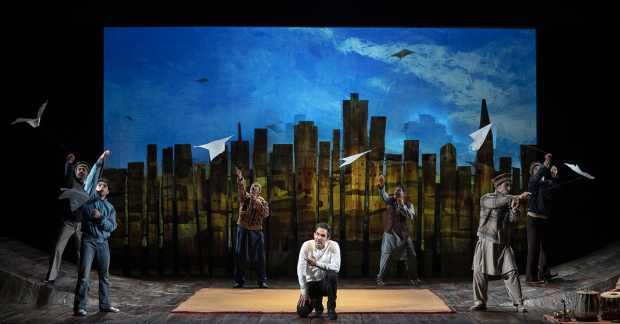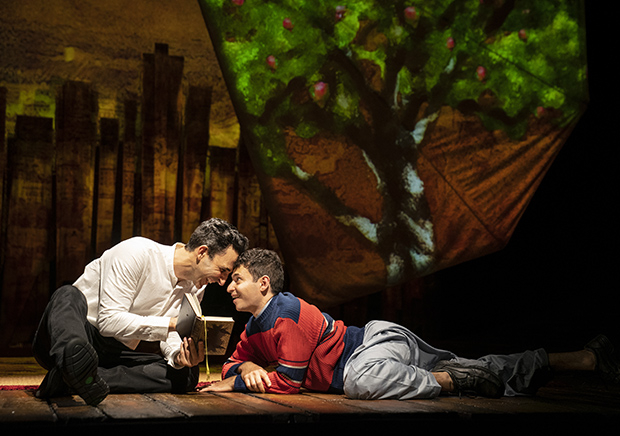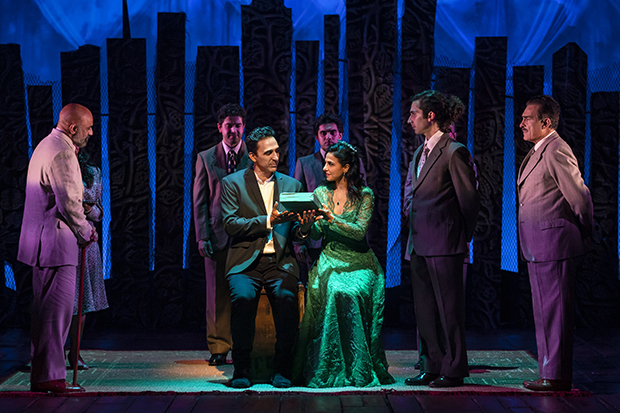Review: Khaled Hosseini's The Kite Runner Comes to Broadway. Is It as Good as the Book?

(© Joan Marcus)
I'm sort of baffled by the stage adaptation of The Kite Runner at the Helen Hayes Theatre. Not that it exists; the dramatic bones within Khaled Hosseini's beloved and bestselling novel are strong and worthy. But Matthew Spangler's script is just so clumsy, and Giles Croft's production (which originated at the Nottingham Playhouse and Liverpool Everyman in England in 2013 before moving to the West End years later) is just so bland, that I couldn't help but wonder why this is the theatricalized version of the material that a group of more than two-dozen producers chose to take to Broadway.
The Kite Runner became a literary sensation in the early 2000s and rightly so: It's a great book that tells a compelling story about male relationships. It chronicles the life of Amir (Amir Arison), a wealthy Afghan boy who becomes an American novelist after he and his father (the forceful Faran Tahir) escape the Soviet invasion of Afghanistan. Hosseini specifically focuses on Amir's inseparable childhood friendship with Hassan (Eric Sirakian), the son of his father's best friend and servant, Ali (Evan Zes, extremely sweet). It is Amir's eventual betrayal of the doting Hassan, following an assault against the boy, that haunts his life. When the chance comes for Amir to rest his guilty conscience decades later when Afghanistan is overtaken by the Taliban, he is determined to make things as right as he can.
Spangler, a university professor, began developing this script in 2005 by dramatizing scenes in order to more fully engage his students with the topics Hosseini raises. Hosseini himself granted Spangler permission, and as he worked on it further, the author, Spangler says in a program note, was available for notes and advice every step of the way. Perhaps Hosseini was too close to the project, or perhaps Spangler was too afraid or unwilling to deviate from the source material. Either way, there's not much in the way of drama in the staged Kite Runner's final form.

(© Joan Marcus)
Sure, there are a lot of events, but Spangler commits the cardinal sin of theatrical storytelling: He has a narrator describe it all to us. All the little details that gave color to the proceedings are gone. Many of the characters become sketches. The villain of the piece, depraved local bully turned Taliban heavy Assef (Amir Malaklou), is a moustache-twirling baddie. Amir's eventual wife, Soraya (Azita Ghanizada), is peripheral. Spangler reduces this immensely human story about guilt and redemption into two-and-a-half hours of "And then this happened."
I don't know if Arison, who left his series regular role on the NBC hit The Blacklist specifically so he could star in this play, made the right call in the long run, but for the time being, it's a good move. Never leaving the stage, this is a terrific showcase for him, and Arison delivers a warm, funny performance that devastatingly communicates Amir's heartbreak. Admittedly, he does get a little too histrionic at times, which is more Croft's fault than his for allowing it, but I'll forgive it because Arison really moved me by the end. He is nicely matched with Sirakian, whose big-hearted, open-faced performance is so sweet and so sad. His guilelessness is really affecting right when it needs to be, and it hits you right in the chest.
At best, Croft's spare production is moderately elegant. Charles Balfour's lighting gives us the burnt authenticity of the desert that the earnest script lacks. Salar Nader sits on the edge of the stage to play the tabla live as underscoring, which is a very nice touch and helps raise the suspense. At worst, though, the staging lacks the kind of visual flair needed to make up for the insufficient script. Barney George's set amounts to a halfpipe ramp, cut-out skyline, and two large kites that come down to act as scrims for William Simpson's location-defining projections, while the costumes (also by George) are shockingly ordinary. The fight direction by Philip D'Orléans is particularly bad: the climactic confrontation between Amir and Assef, one that is heavily alluded to throughout, is embarrassingly amateur.
All this amounts to a stage adaptation that doesn't justify its own existence. Gripping? Sure. But that's Hosseini, not this team. Neither Spangler's text nor Croft's production does anything to elevate the material Hosseini provided for them; they just ride his coattails and refashion it in disappointingly unimaginative ways. There's a reason it took three years to get from Nottingham to London, and six years to get cross the Atlantic to get to New York. Just looking at the timeline will tell you everything you need to know about the quality, and how much it's lacking.
Also … this play is called The Kite Runner. Kites play a big part in this story. Why are the only kites we actually see flying projected on a screen in the distance? If you can't figure out how to make that work live onstage, with all the theatrical magic we have these days, you're not doing the job right.

(© Joan Marcus)











